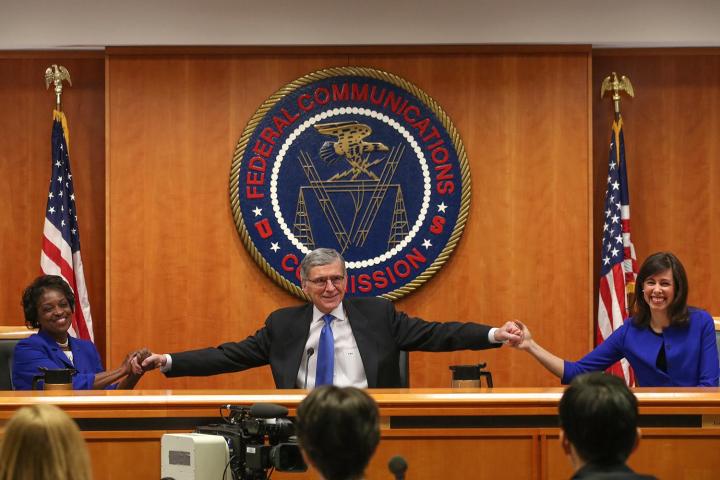
The report examined four different zero-rated services — first-party streaming services, download benefits, and other programs specifically exempted from subscribers’ data caps — in order to determine whether they disadvantaged third-party services that weren’t afforded the same privilege. It found that Verizon’s FreeBee Data 360 program and AT&T’s Sponsored Data program could “stifle competition and cause potentially unreasonable discrimination” in favor of the carriers’ own products.
The report accused AT&T of charging exorbitant rates for third parties — crucially, rates higher than it charges on service from its TV subsidiary, DirecTV — and offering more favorable terms than it extended to unaffiliated sponsored data partners. “While observing that AT&T provided incomplete responses to staff inquiries,” Wheeler wrote in a letter to senators, “the report states that the limited information available supports a conclusion that AT&T offers Sponsored Data to third-party content providers at terms and conditions that are effectively less favorable than those it offers to its affiliate, DirecTV.”
The FCC raised similar concerns regarding Verizon’s Go90 platform but concluded it to be less damaging because it “competes in a less developed segment of the marketplace” than AT&T’s DirecTV Now. “The current magnitude of any anticompetitive effects of Verizon’s practices may be smaller than AT&T’s,” the report read. “Nonetheless […] there is the same potential for discriminatory conduct in favor of affiliated services.”
The FCC didn’t raise the same concerns about T-Mobile’s Binge On video service, which similarly zero-rates content from select streaming partners. It was persuaded by the more than 100 partners, including networks like NBC, YouTube, Amazon Video, and YouTube, that signed on the broadcast on T-Mobile’s service. “Given these facts, we find it difficult to envision that Binge On in the form the Bureau reviewed in 2016 could unreasonably interfere with edge providers’ ability to make lawful content, applications, services, or devices available to end users.”
The findings aligned with those of net neutrality advocates like the Electronic Frontier Foundation, who argued zero-rating policies violated the FCC’s rules requiring that all internet traffic be treated equally. A group of like-minded senators, led by Senator Ed Markey (D-MA), praised the report on Wednesday. “These guiding principles will help the FCC, industry, and the public evaluate zero-rating offerings and identify plans that distort competition, stifle innovation, and hamper user choice and free speech,” Markey said in a statement.”I will continue to work with my colleagues to encourage the Commission to enforce these guidelines and ensure that the internet remains a permission-less environment where anyone with an idea or voice can participate.”
FCC Commissioner Ajit Pai, one of two Republicans on the panel and a leading candidate to chair the commission in the upcoming Donald Trump administration, issued a dissent on Wednesday. “This report, which I only saw after the FCC released the document, does not reflect the views of the majority of Commissioners,” he said. “Fortunately, I am confident that this latest regulatory spasm will not have any impact on the Commission’s policymaking or enforcement activities following next week’s inauguration.
AT&T was quick to challenge the FCC’s findings, arguing that its policy of zero-rating was to consumers’ benefit. “It remains unclear why the Wireless Bureau continues to question the value of giving consumers the ability to watch video without incurring any data charges,” AT&T Vice President of Federal Regulatory Joan Marsh said in a statement.
“The practice, which has been embraced by AT&T and other broadband providers, has enabled millions of consumers to enjoy the latest popular content and services — for free. We hope the government continues to support a competitive marketplace that lowers costs and increases choice for consumers.”
Verizon concurred. “We don’t agree with their view on free data and we don’t think customers do either,” Verizon representative Will Johnson said. “Hopefully the next FCC will take into account the views of our customers who greatly benefit from watching professional football, soccer, basketball and other great content on Go90 free of data charges.”
Mobile Future, a trade group representing communications and technology companies, also denounced the findings. “Rather than tipping the scales toward preferred business models, the FCC should let consumers decide for themselves which models, and free data, they prefer,” interim chair Diane Smith said in a statement.
Editors' Recommendations
- Everything you need to know about the massive AT&T outage
- The best prepaid phone plans in 2023: the 6 best ones
- T-Mobile’s huge lead in 5G speeds isn’t going anywhere
- T-Mobile’s 5G is still unmatched — but have speeds plateaued?
- Here’s another big reason why T-Mobile 5G dominates AT&T and Verizon
